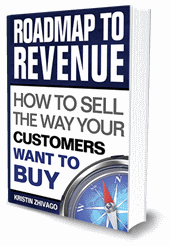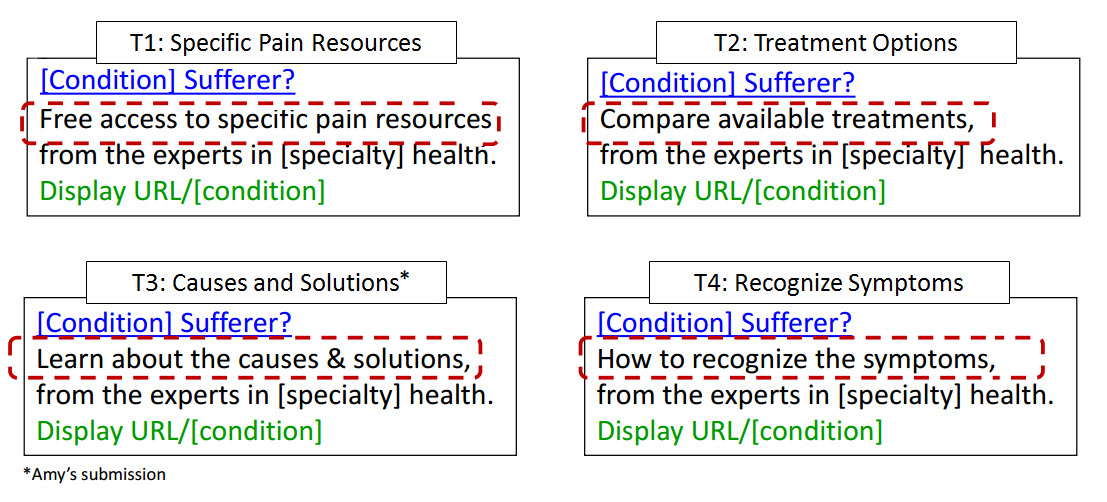 In today’s Web clinic, “What Your Customers Want: How to predict customer behavior for maximum ROI,” Dr. Flint McGlaughlin will present a recent PPC experiment from our lab in which you, the MarketingExperiments blog reader, helped create the treatment.
In today’s Web clinic, “What Your Customers Want: How to predict customer behavior for maximum ROI,” Dr. Flint McGlaughlin will present a recent PPC experiment from our lab in which you, the MarketingExperiments blog reader, helped create the treatment.
But before we do that, we wanted to give you a chance to predict which PPC ad received a higher clickthrough rate.
The marketer with the best answer will win a copy of Kristin Zhivago’s book, Roadmap to Revenue. Kristin is a speaker at the upcoming Optimization Summit 2012 in Denver.
The background
In a recent PPC test for a MECLABS Research Partner (designed in part by Amy Harold), the Partner wanted to see which ad would generate more clicks. The goal here was to learn enough about the audience to be able to plan a content strategy that would pull in more prospects to their offer.
Here are the four treatments we tested:
How to win
To win the book (and the respect of your peers), you need to tell us two things in the comments of this blog post:
- Which treatment won
- Why it won
The marketer who guesses the correct treatment and gives us the best reason why they think that treatment won, will win the contest and be featured on this blog post as having near-psychic levels of marketing intuition.
So go ahead and study the slides embedded above and then leave a comment below. But do it quickly because the deadline is 4:00 EDT today.
P.S. To be among the first to know whether you were right or not, you can tune into today’s Web clinic at 4:00 pm EDT (hence the deadline) where we’ll reveal the results and dive into how you can predict your customers’ behavior.
***UPDATE***
Congratulations to Tanith, who gave the nearest thing to a correct answer of any of the commenters!
If I wasn’t diagnosed, but wondered if I had the condition, I’d go for T4.
Technically, Luke Thorpe was the only one who gave the absolute correct answer, but because he works in this office, I’m not sure I believed him when he told me he hadn’t seen the winner beforehand. 🙂
So I can’t in good conscience make him the official winner.
Tanith will be receiving a copy of Roadmap to Revenue in the coming week or so.
Thank you to all of our commenters, and thank you especially to Tanith for having great marketing intuition!
Related Resources:
What Your Customers Want: How to predict customer behavior for maximum ROI – View the Web clinic replay to learn more about what your customers want





Treatment 2.
The headline “[Condition] sufferer?”talks to people who already know their condition.
People who suffer from sciatic nerve or lumbar back pain just want to know which is the best treatment to eliminate their pain and then they would be able to make their choice.
So I think the best variable is “Compare available treatments”.
Winner: Recognize the symptoms from the experts
Why: People will be attracted to this AD because it enables them to self-diagnose their condition. I think this is a logical first step before moving towards the free access to resources.
Treatment 2.
This approach self-qualifies the traffic by speaking to people down-the-funnel (i.e. engaged) by the condition but who don’t want to be sold to. The tone “compare options” sounds the most urgent yet brand-neutral, giving it an effective 1-2 punch.
Great comments guys! let’s get some more on here before 4:00 EDT.
I think Treatment 2 will win… People interested in this probably already have back pain and want to know what it will take to get rid of it.
Treatment 1 – The value is clearly stated and emphasizes what the individual will get by simply clicking on the link.
Getting “free access to back pain resources from experts…” is the perceived value that outweighs any doubt.
Haha, I think you really would need to have “near-psychic levels of marketing intuition” to predict this. It’s highly possible that a searcher’s motivation may stem from the need for information on either the causes, symptoms OR treatments for a given condition.
This Partner would do well to incorporate all aspects into their content strategy.
As the KPI is just CTR, I’m going to go with T3.
Because of their specificity, T2 and T4 are likely to qualify to some degree, and therefore possibly reduce the number of clicks. T1 on the other hand, although clearly stating a value, feels a little too vague.
I think Treatment 2 will win. If I’m in pain and my current treatment isn’t working, I would welcome an opportunity to compare treatments for my condition. I could look at the options and decide if something else might be better for me. “Compare options” sounds unbiased and “from experts in spine health” provides credibility.
I think Amy’s is a close second. 🙂
It would depend on what the person was looking for. If I wasn’t diagnosed, but wondered if I had the condition, I’d go for T4. If I was diagnosed and looking to learn more about treatment options, I’d go with T2. T3 fits for either of those two purposes, but it lacks oomph. In T2 and T4, you do specific things — compare your potential treatments, compare your symptoms — while T3 is more passive and less personally applicable.
As for T1, it would perform well if there wasn’t a lot of other stuff all advertising “free,” or if there were a lot of paid resources.
T2.
People in pain have an urgency to want to alleviate the pain as soon as possible.
Comparatively, they may not be as interested to ‘learn more’ about their pain from ‘free resources’ than ‘show me which treatment options I have … NOW!’.
T3: Causes and Solutions
If we use the experiment hypothesis that states what the condition-based searchers are after, then T3 should have the highest CTR. The ad addresses all four possible types of condition-based searchers outlined in the experiment hypothesis; I think Amy Harold nailed it when trying to find a way to address all of these search scenarios. Condition searchers may be needing more information before they’re ready to be pitched any solutions, which explains why it takes more time for these particular visitors to convert and buy the Accurascope procedure after coming into the office.
Winner:
I think T3 will get the highest CTR given the conditions.
Why:
The search terms they’re bidding on don’t include “sufferer” so these ads would display for anyone searching on the broad terms. Some searchers may be doing research or fact finding for other reasons besides being a sufferer. “Learn about the causes & solutions” would appeal to both sufferers and anyone doing research. T1 is also broad in nature, but perhaps a little too broad with the terminology of “resources” versus “causes & solutions.”
I think for some industries and offers “free” could be very appealing and make a difference in CTRs, but there is a lot of free medical information online already, so I don’t think “free” carries a lot of weight here and may be too promotional.
The results are in! See above update…
Winner is T4 because it is the only one that gives actionable information that anyone in need can use right away and benefit from.
This is not only helpful, but builds trust; which ultimately increases the CTR.
Damn! 🙂 It makes perfect sense that self diagnosis would be the start of the funnel. What threw me was the specificity of the condition terms. I wrongly assumed that if they knew these terms, they probably already knew they suffering from the condition, negating any need to read up about symptoms.
I guess people may have searched broadly to begin with, then narrowed their searching by focusing in on the specific conditions.
Thanks again for another fun contest!
No problem Niall! To be honest before we ran the test, I was sure that “back pain resources” was going to win. Couldn’t have been more wrong. It was by far the worst performing. 🙂